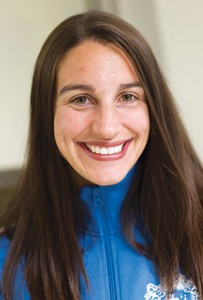
Roz Puleo witnessed first hand the terrible impact of the Boston Marathon bombing.
Somerville resident Roz Puleo had never been in battle, but she knew right away something was wrong when she heard the first bomb explode at the 2013 Boston Marathon.
“I don’t know how, but I had a gut feeling that it was something bad,” said Puleo, a 2011 graduate of the MGH Institute of Health Professions School of Nursing, who was volunteering in one of the medical tents across the street from the Boylston Street finish line, about the infamous attack that killed three people on April 15.
With smoke rising from across the street, fear was in the air during those first few moments as people tried to decipher exactly what had happened. Then the second bomb went off, a call went out over a loudspeaker asking all IV nurses and physicians to report to the finish line, and she knew her original task of treating exhausted and dehydrated runners was over.
The medical team to which she was assigned, which included a physician, physical therapists, other nurses, and athletic trainers, quickly shifted into emergency care mode. Using limited supplies, the team treated dozens of spectators who had been injured by flying shrapnel.
“We were nervous because we didn’t know if there were other bombs,” explained Puleo, who works as a family medicine nurse practitioner at Lynn Community Health Center “But I’ll tell you – it was the most impressive display of teamwork I’ve ever been a part of. The way everyone’s instincts kicked in was unbelievable.”
Victims with more serious injuries passed through her tent on the way to ambulances which whisked them away to local hospitals. Puleo, who is expecting her first child in September, stayed inside the tent, doing what she could to comfort those with less severe injuries and keep calm amidst the chaos.
“With the injuries I saw, and the amount of blood that was lost, I was amazed so many people lived,” she said, noting that all the victims treated in the tent survived.
Just 45 minutes after the bombs detonated (“It seemed like an eternity,” she recalled), the tent was evacuated of all personnel, although Puleo stayed near the scene in case more help was needed.
A month after the bombing, the nightmares and visions that have haunted her are slowly fading. She’s begun to look back at the horror and dissect her actions.
“Maybe I could have comforted people better, or done more, I don’t know,” Puleo mused. “We all did what we needed to do.”
MGH Institute of Health Professions, founded by Massachusetts General Hospital in 1977, is an innovative and independent graduate school in Boston’s Charlestown Navy Yard. A member of Partners HealthCare, the MGH Institute prepares advanced practice professionals in the fields of nursing, physical therapy, and speech-language pathology through a distinctive combination of academic study, clinical practice, and research. More than 1,200 students are enrolled in graduate level and certificate programs, with an increasing number of courses available online. The Institute is accredited by the New England Association of Schools and Colleges.















Reader Comments